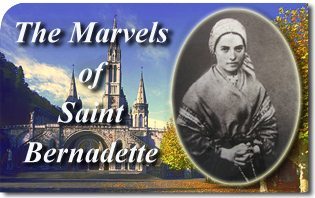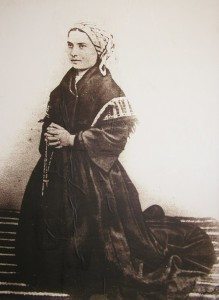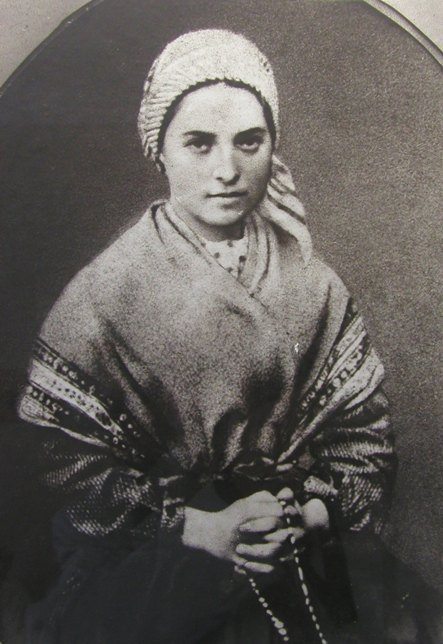 After reading the life of any saint, we close the book exclaiming, “What a great saint! I did not think something like this could exist.” Indeed, as long as it is well written, the life of any saint is a unique marvel full of surprises.
After reading the life of any saint, we close the book exclaiming, “What a great saint! I did not think something like this could exist.” Indeed, as long as it is well written, the life of any saint is a unique marvel full of surprises.
The life of Saint Bernadette Soubirous is no exception. She was a French peasant girl from an area of the Pyrenees mountains which, from a certain standpoint, blends together aspects of Spain and France. She looks very French although she has Spanish features.
Looking at her authentic pictures (not usually found in churches), we see a person with a slightly squarish face with regular and well-defined features. She has large black eyes with a certain fixed Spanish gaze unlike the quicker and darting French gaze. Her Spanish gaze is penetrating almost to the point of an x-ray. Together with her Spanish nose, her face presents a coherence that really stands out and marks her from top to bottom.
Her mindset is direct and straightforward. She does not mince words. She was a person with very high horizons but had a very simple upbringing, meaning that she was never taught to be reserved or discreet. What she thought, she would come right out and say.
Her whole expression is one of complete detachment. She was completely humble and did not want to be anyone special. Her goal was to go about the service of Our Lady without caring about what others think.

Her whole expression is one of complete detachment. She was completely humble, and her goal was to go about the service of Our Lady without caring about what others thought.
Consider the fact that Saint Bernadette could have become vain when seeing huge crowds gathered to see her speak with Our Lady at the Grotto during the apparitions.
This fact is aggravated by the fact that Saint Bernadette was from the countryside where such attention causes a much greater impression. The smaller the town, the more importance one attaches to it. It is easier for a New Yorker (to use an American example) to criticize New York than for villagers to criticize their own little town.
When the mayor of the small village dies, the whole town shows up for the funeral. The entire village represents the whole world. It is considered extraordinary.
We might add that this atmosphere of the small countryside village has much more life and is more accommodating than the huge modern-day Babels in which the individual is like a loose grain of sand.
In the village, each inhabitant is like the living cell of an organism. In New York or Sao Paulo, each is like a grain of sand in a huge pile in which each grain weighs on top of the others, and from which every windstorm takes grains far away.
Thus, we can understand what it meant for Saint Bernadette to have the whole town of Lourdes come see her. It was something extraordinary. However, her reaction was not to become vain.
Rather she remained indifferent to the attention. During the whole time, she was completely and naturally herself before everyone. When called by the police to speak about the revelations, she behaved with extraordinary fearlessness and ease. Toward her parents, the parish priest and other upright people with whom she dealt, and later with her religious superiors, she was a model of respect and obedience.
Thus, we can see in her the spirit of a true ultramontane and Catholic woman. She is a true saint totally indifferent to the pomp and esteem of this world. By disregarding everything, she was not disregarded. For if she would have sought the applause of the world, she would not be free to do anything except those actions which would gain her this applause. She would be forced to play to their tune. Saint Bernadette Soubirous’ attitude was to be herself. If the world did not like it, she did not care. All she cared about was being faithful to the Holy Catholic Church.
When it came to legitimate authorities, her attitude was different. She took great care to show extreme obedience and respect. This is because there was a supernatural principle that was involved and not merely the human factor of herself. She did not care about the ways of the world, but she showed all due care and respect to things with a religious root, which came from God.
“I am the Immaculate Conception.”
Saint Bernadette Soubirous impressed many by her conduct during the apparitions. She converted countless people simply by the way she made the sign of the cross. She learned this from Our Lady – the supreme model of friends and worshippers of Jesus Christ – and thus she acquired a love of suffering and of the Cross of Christ. Hence something of Our Lady’s unction would show in her when she made the sign of the cross.
Even after the apparitions, she edified people as they watched her make the sign of the cross, something we often do haphazardly without attaching due importance to what we are doing.
However, what most deeply impressed people was her whole demeanor during the apparitions. They perceived she was in contact with something they could not see but came from outside her.
They noted an extraordinary transformation in her. From a simple peasant girl, she would take on a majesty that impressed everybody. One lady from high society who saw her during an apparition said she had never seen a girl from the aristocracy with the bearing and stature of Saint Bernadette while speaking to Our Lady. In other words, because she was dealing with the Queen of Heaven and Earth, this Queen communicated to her something regal, and something of this virtue remained in her soul.
Many people realized that Our Lady was speaking to her, not because they saw Our Lady but because they saw Bernadette as a mirror of Our Lady. Indeed, during the apparitions, the seer was a kind of Speculum Mariae, or better, Speculum Justitiae. It is truly admirable to see how Our Lady communicates her virtues to her devotees, who, so to speak, imbibe them from her.

all for a mysterious sinner who she did not name.
When a sister at her convent insisted with Sister Bernadette to tell them about the dress Our Lady was wearing when she appeared. She answered that if they wanted to know the details let them ask Our Lady to come back so they can see for themselves.
This was characteristic of Saint Bernadette’s many picturesque comments. Her superior often tried to make them less biting and more polite but finally allowed them to go through. Bernadette’s sayings had a note that was both comic and fiery with a sharp edge that showed her bubbly temperament.
When asked if she was proud of being chosen by Our Lady, she replied: “Who do you think I am? The Blessed Mother picked me because I was the most ignorant one. Had she found someone more ignorant than me she would certainly have chosen her.”
Such a comment was not only humble but also quite true. Humility is truth. Our Lady chose her because she was the most ignorant girl in Lourdes. Before the revelations, she was a good girl but not a saint. Our Lady chose her because her ignorance was one of the extraordinary arguments to confirm the apparitions. She was such an ignorant peasant girl that she simply had no means to know about the spiritual things she told the authorities. She did not have the spiritual background to maintain the attitude she maintained. Her ignorance was one of the apologetic aspects of Lourdes.
While very lively, Saint Bernadette could easily go unnoticed. In time, her illness gradually wore her down. Actually her situation is similar to that of Saint Therese, the Little Flower. She offered her life as an expiatory victim for sinners, but above all for a mysterious sinner who she did not name and for whom she suffered horribly so he would make amends and be sanctified. Was it a man of her time or a man to come in the future, whose existence Providence revealed to her? No one knows.
One biography of Saint Bernadette mentions the fact that Our Lady revealed a secret to her, which she never said anything about. It seems that it was something related to the identity of that mysterious sinner. Thus the three great apparitions of Our Lady of our times all had secrets: Our Lady of La Salette, Our Lady of Lourdes, and Our Lady of Fatima.
Let us ask Saint Bernadette to obtain for us a great devotion to Our Lady and that she may increasingly communicate Our Lady’s virtues to us.
The preceding text is taken from an informal lecture Professor Plinio Corrêa de Oliveira gave on April 15, 1966. It has been translated and adapted for publication without his revision. –Ed.
Related Articles:
The Dogma of the Immaculate Conception:
A First Milestone in the Rise of the Counter-Revolution
